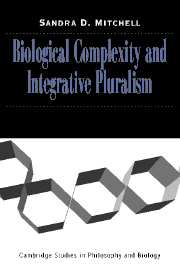Preface and Acknowledgments
Published online by Cambridge University Press: 05 June 2012
Summary
This collection of essays defends integrative pluralism as the best description of the relationship of scientific theories, models, and explanations of complex biological phenomena. Complexity is endemic in biology, but it is constituted by various features of multicomponent, multilevel, evolved systems. The types of scientific representations and the very methods we use to study biological systems must reflect both that complexity and variety. Developing models of single causal components, such as the effects of genetic variation, or of single-level interactions, such as the operation of selection on individuals, give valuable, if partial, accounts. These explanations need to be integrated in order to understand what historical, proximal, and interactive processes generate the array of biological phenomena we observe.
Clearly, the way the world is dictates what we can say about it. The way our representations are structured also plays a significant role in the scientific accounts we develop. Theories and models are idealized, partial descriptions, couched in the conceptual frameworks of the day, framed in a language that carries meanings from the broader social context. The suggestion that our current best theories of the nature of nature exactly capture the world in all its details is hubris. The idealized and partial character of our representations suggest that there will never be a single account that can do all the work of describing and explaining complex phenomena. Different degrees of abstraction, attention to different components of a system, are appropriate to our varying pragmatic goals and conceptual and computational abilities.
- Type
- Chapter
- Information
- Biological Complexity and Integrative Pluralism , pp. xiii - xviPublisher: Cambridge University PressPrint publication year: 2003

